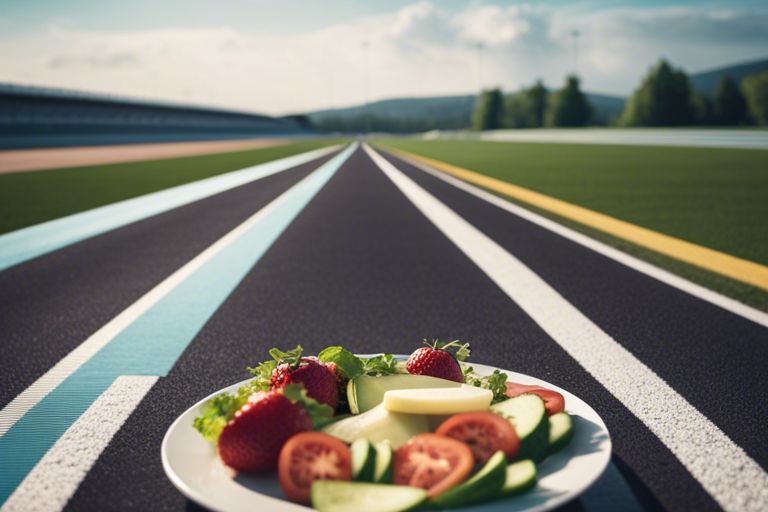In the context of improving your jogging speed, paying attention to your nutrition is key. While there are many foods that can enhance your performance, there are also some common pitfalls that can slow you down. In this blog post, we will research into the foods and drinks that you should avoid to optimise your speed and performance while jogging. By steering clear of these detrimental choices, you can help your body to function at its best and maximise your jogging potential. Let’s explore what to avoid for speed when it comes to jogging and nutrition.
Key Takeaways:
- Avoid heavy, high-fat meals: Heavy meals can slow you down and make you feel sluggish while jogging. Opt for light, easy-to-digest meals before running.
- Avoid sugary snacks: Sugary snacks can cause quick energy spikes followed by crashes, impacting your performance. Choose complex carbohydrates for sustained energy levels.
- Avoid excessive caffeine intake: While a little caffeine can boost performance, too much can lead to dehydration and jitteriness. Moderation is key.
- Avoid alcohol consumption before jogging: Alcohol can dehydrate your body and affect your coordination, making it unsafe to run. Keep alcohol consumption to a minimum before your run.
- Avoid high-fibre foods just before jogging: High-fibre foods can cause digestive issues while running. It’s best to consume them at least a couple of hours before your jog.
Common Jogging Nutrition Mistakes
The Pitfalls of Inadequate Pre-Run Meals
One common mistake that many runners make is not fueling up properly before a run. Skipping or inadequate pre-run meals can leave you feeling fatigued, weak, and unable to perform at your best. It is important to consume a balanced meal that includes carbohydrates for energy, protein for muscle support, and some healthy fats for sustained energy.
The Risks of Overconsumption Before Running
On the other end of the spectrum, overeating before a run can also lead to discomfort and poor performance. Consuming too much food can cause cramps, bloating, and sluggishness as your body works to digest the large meal. It is advisable to eat a moderate meal a few hours before your run to prevent any potential digestive issues.
It’s crucial to find the right balance when it comes to pre-run nutrition. Listen to your body’s hunger cues and experiment with different meal timings and portion sizes to determine what works best for you. Recall, the goal is to fuel your body efficiently for optimal performance without feeling weighed down or deprived of energy.
Optimal Foods for Jogging Performance
Food Categories to Include
With respect to enhancing your jogging performance, there are key food categories you should include in your diet. Focus on consuming complex carbohydrates such as whole grains, fruits and vegetables for sustained energy levels. Make sure to incorporate lean proteins like chicken, fish, and legumes to support muscle repair and growth. Don’t forget about healthy fats from sources like nuts, seeds, and avocado to provide crucial nutrients for optimal performance.
Timing Your Nutrition for Peak Speed
Timing your nutrition plays a crucial role in maximising your jogging speed. Aim to consume a balanced meal containing carbohydrates, protein, and fats at least 2-3 hours before your run to fuel your muscles and maintain energy levels. For shorter runs, a light snack like a banana or a handful of nuts 30 minutes before can provide a quick energy boost. Remember to also hydrate adequately before, during, and after your run to support your performance and recovery.
Dietary Components to Avoid for Improved Speed
Problematic Food Types for Runners
Pertaining to improving speed and performance as a runner, there are certain dietary components that should be avoided. These include:
|
|
|
|
|
|
| |
|
The consumption of these food types can hinder your speed and overall performance as a runner. The key is to focus on a balanced diet that fuels your body optimally for training and races. The right nutrition can make a significant difference in your running performance.
Hydration Missteps that Slow You Down
Ensuring proper hydration is crucial for runners looking to improve their speed and endurance. Hydration missteps can significantly impact your performance on the track or road. It’s important to avoid:
Dehydration can lead to fatigue, muscle cramps, and a decline in overall performance. On the other hand, overhydration can result in hyponatremia, a dangerous condition caused by low sodium levels in the blood. Finding the right balance and staying properly hydrated is key to unlocking your full running potential.
Supplementary Tips for Enhanced Running Speed
Integrating Cross-Training Into Your Routine
For improved running speed, it is beneficial to incorporate cross-training into your routine. Cross-training involves engaging in various activities such as cycling, swimming, or strength training to complement your running. This helps prevent overuse injuries, strengthens different muscle groups, and enhances overall fitness. Aim to include cross-training sessions 1-2 times per week, focusing on activities that target areas of weakness or imbalances in your body.
Mindfulness in Eating: Listening to Your Body
Concerning nutrition for running speed, mindfulness in eating plays a crucial role. By listening to your body’s hunger and fullness cues, you can better fuel your runs and recover effectively. Avoid distractions while eating, chew your food slowly, and pay attention to how different foods make you feel. This awareness can help you make better food choices to support your running performance.
Mindfulness in eating involves being present in the moment when consuming food, acknowledging the taste, texture, and satisfaction it provides. By tuning into your body’s signals, you can cultivate a healthier relationship with food and make choices that benefit your running goals. It’s not just about what you eat but also how you eat that can impact your overall performance as a runner.
Conclusion: Jogging and Nutrition – What to Avoid for Speed
In the final consideration, when aiming to improve your jogging speed, avoiding certain foods such as heavy, greasy meals, sugary snacks, and high-fibre foods just before a run can significantly impact your performance. These food choices can lead to discomfort, sluggishness, and reduced energy levels, hindering your ability to run at your fastest pace. Instead, opt for easily digestible, balanced meals that provide the necessary fuel for your run without causing digestive issues. Keep in mind, proper nutrition plays a crucial role in your running performance, so making smart food choices can help you achieve your speed goals and improve your overall running experience.
FAQ
Q: What are the key nutrition tips for improving speed while jogging?
A: To boost your speed while jogging, focus on consuming a well-balanced diet rich in lean proteins, complex carbohydrates, and healthy fats. Hydrate adequately and consider incorporating foods high in potassium and antioxidants for muscle function and recovery.
Q: How does caffeine intake affect jogging speed?
A: Consuming moderate amounts of caffeine before a jog can enhance performance by increasing alertness and reducing perceived exertion. However, excessive caffeine intake may lead to dehydration and negatively impact your speed.
Q: Is it advisable to eat just before a high-speed jogging session?
A: It is recommended to eat a light meal or snack containing easily digestible carbohydrates and a small amount of protein at least 1-2 hours before a high-speed jogging session. Consuming a heavy meal right before can cause discomfort and hinder performance.
Q: Are sugary energy drinks beneficial for speed improvement during jogging?
A: While sugary energy drinks may provide a temporary energy boost, they can lead to a rapid spike and crash in blood sugar levels, disrupting your pace and overall performance. Opt for natural sources of energy like fruits or nuts instead.
Q: What foods should be avoided before a speed-focused jogging session?
A: Avoid consuming high-fat, high-fibre, or spicy foods before a speed-focused jogging session as they can cause digestive issues and discomfort. Additionally, steer clear of sugary treats, as they can lead to energy crashes mid-run, impacting your speed.






